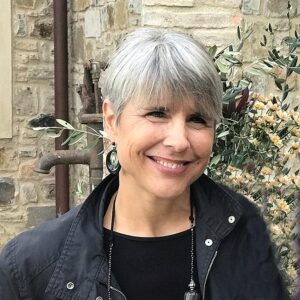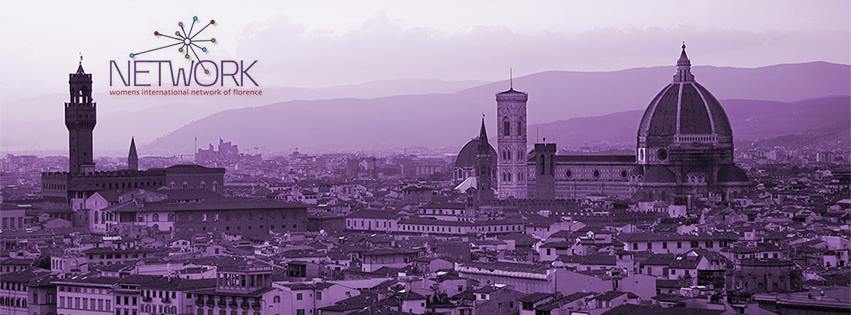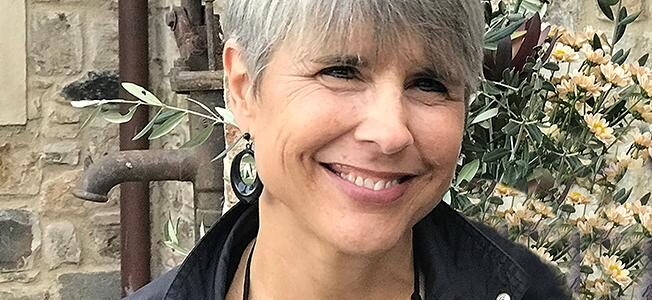
Sylvia’s journey in Florence began in 1979 when she came from the US to attend a semester of study abroad with Syracuse University, stayed a year, and then returned to Florence after graduating from Goucher College. Like many young women coming to Italy, she was drawn both by love for the city as well as other attractions – i.e., falling in love with an Italian man – and has been here since 1981.
Sylvia studied Spanish in high school and college, which helped with learning Italian during her junior year abroad in Florence. In summer 1981, she attended an intensive advanced language course and then enrolled in the School for Interpreters and Translators in the fall, where she also studied German. After completing the 4-year German program, she channeled her linguistic skills to work for a communications firm as an English-language translator/technical writer.
In 1988 she took a 5-year break from working outside the home to have her two children, now ages 35 and 32. In 1993, a position opened at Syracuse University’s Florence program, where Sylvia has worked ever since in different administrative capacities. Meanwhile, in 2008, she earned her license as a Florence tour guide after attending an intensive yearlong course of study. The course was intended for her son, but she took his place when he realized it wasn’t for him. This opened a new and very unexpected path working as a tour guide on weekends and holidays alongside her regular job at Syracuse Florence.
In 2011, she took a position at Syracuse Florence as Library Coordinator. She soon realized she needed and wanted more formal training to do the job well, so she took a 16-month leave of absence in 2015-2016 to study on Syracuse’s home campus on a full scholarship grant. She completed her master’s in library and information sciences in May 2017.
In 2020, COVID-19 led to yet other opportunities and interests. Placed on furlough in March 2020 when the University facilities were closed during lockdown, she focused her attention on a passion she’d discovered while studying library sciences and cultural heritage preservation, by researching and compiling her family history. Doing research for others came about by chance when a friend of a friend, whose grandparents came from the town of Barga, just north of Lucca, approached her way with a request to research his ancestors. Sylvia’s boyfriend had a second home in Barga, so she was already familiar with the town and its inhabitants.
The satisfaction of solving family mysteries led to intensive reading, attending online webinars, and carrying out any form of self-study she could to become a proficient Italian genealogist; meanwhile, more requests were coming in. The work is slow, she says, but fascinating. She explains that data comes primarily from two sources: church and civil records. The Church has kept invaluable vital records since the 1560s; whereas local municipalities only started keeping civil records in the 1860s with the Unification of Italy. Church records are the most helpful because of the amount of time they cover, but they’re also the most challenging, as they are written by hand in a hurried manner, usually in Latin, in unindexed registries, where the paper is often flaking and disintegrating. But the stories they tell are fascinating.
Since direct access to parish records is so important, Sylvia has started taking only requests for Tuscany. Access is usually restricted to local archivists, but by explaining that the work is being done to help descendants of emigrants connect with their Italian origins, kindhearted priests have made exceptions.
People typically contact Sylvia for one of three reasons: to demonstrate Italian heritage to obtain citizenship; to build their family tree for personal curiosity and interest; to prepare for a visit to their ancestral village in Italy, ideally connecting with living relatives while here. This is the type of project she enjoys most, where she combines her passion for family history with her experience as a translator, tour guide, and researcher.
Genealogical research has become the basis for Sylvia’s future objectives as she hopes to dedicate more time to it once she retires from the University a few years from now and can focus on writing in addition to researching.
Reach out to her: www.theitaliangenealogist.com

